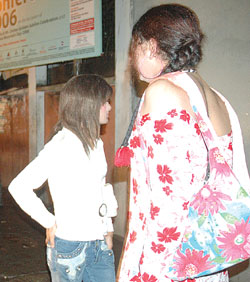|
|
| EASY TARGET: Members of Kathmandu\'s transgendered community, such as these metis in Thamel are regularly arrested and charged with obscenity. |
One night some months ago, 20-year-old Bhumika Shrestha was walking home from work when she was arrested and imprisoned in a dark cell for almost a fortnight.
Police told Shrestha, who works with the Blue Diamond Society, that they had orders to arrest metis or transgendered people for involvement in "obscene activities" and spreading "immoral behaviour".
Nepal's legal system does not define obscenity and there is no specific law that addresses it. As a result, says advocate Sabin Shrestha of the Forum for Women, Law and Development, vulnerable sections of the society are persecuted and the perpetrators get away.
\'Obscenity' is often used as a legal catch-all in the moral policing of vulnerable groups like sex workers, metis, and women in general. There is no protection of the rights of victims of obscenity-related offences, usually sexual harassment. "Legally this is an issue of exploitation and violence," says Sapana Pradhan Malla of FWLD.
Obscenity is vaguely and partially parsed as having to do with exposing the body, and pornography, in various places in the 1959 Defamation Act, the 1970 Public Offence and Punishment Act, the 1992 Children Act, in the civil code under Intention to Sexual Intercourse, in last year's Electronic Transactions Act 2006, and in Nepal Press Council's code of conduct.
But if you've been at the receiving end of obscene behaviour, legal experts say there is scant precedent of people using any of these provisions to seek justice. "First of all it is hard to get evidence, and privacy of the victims is hard to maintain," says Kishor Silwal, associate professor of criminology at Nepal Law Campus. And even if a perpetrator is found guilty, explains Shrestha, "the laws are punishment-centred, none of them talk about victim's compensation, physical or mental state.
The flawed laws related to obscenity are perhaps not closely scrutinised because they constitute a fluid idea of what is deemed socially acceptable. The issue comes down to striking a balance between legal norms and social mores, says Malla. "Legally, sexual expression is a right. Socially, individuals need to see that their right to expression does not offend," she explains.
Nepal should perhaps look to legal definitions of obscenity in other countries, says Malla, since most of them accept that obscenity is perceived differently across cultures, countries, religions, generations, and ethnicities. Side by side, there need to be stronger mechanisms to protect victims of sexual harassment, or 'obscene behaviour'.



